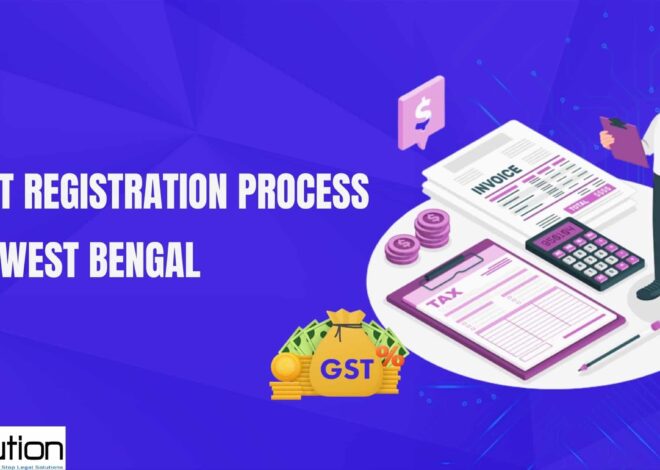
GST Registration for Freelancers -Quick Process
Table of Contents
ToggleIntroduction
Freelancing has become a popular way of working in the modern gig economy. With the rise of remote work and the increasing demand for specialized skills, many individuals are choosing to work as freelancers. However, along with the freedom and flexibility of freelancing comes the responsibility of understanding and complying with tax regulations, including the Goods and Services Tax (GST).
GST is an indirect tax that applies to the supply of goods and services in India. In this blog, we will demystify GST registration for freelancers, explaining why it may be necessary, how to register, and what you need to do to stay compliant with tax laws.
When is GST Registration Required for Freelancers?
GST registration is mandatory for freelancers in India under certain conditions:
Threshold Limit: If your aggregate turnover (total income) exceeds the threshold limit, you must register for GST. The threshold limit for GST registration was ₹20 lakhs for most states, but it may vary based on location and the type of goods or services you provide.
It should be noted that the minimum turnover for GST in India is different for some special category states. These special category states have a minimum threshold limit of Rs. 20 Lakhs (for the supply of goods) and Rs. 10 lakhs (for the supply of services). These special category states include Arunachal Pradesh, Manipur, Meghalaya, Mizoram, Nagaland, Tripura, and Sikkim.
Inter-State Supply: Regardless of your turnover, if you provide services or sell goods across state lines, you are required to register for GST.
Voluntary Registration: Even if you do not meet the mandatory registration criteria, you can choose to register voluntarily. This can help you claim input tax credit and establish your business as more credible.
Steps to Register for GST as a Freelancer
Gather Documents: Before you start the registration process, ensure you have the necessary documents, such as your PAN card, proof of address, bank account details, and photographs.
Online Registration: Visit the official GST portal and click on “Register Now.” You will need to provide your PAN, mobile number, and email address to begin the registration process.
OTP Verification: You will receive an OTP (One-Time Password) on your mobile and email. Use these OTPs to verify your details on the GST portal.
Filling the Form: Complete the GST REG-01 form. You will need to provide details about your business, including the nature of your services or goods, and your business location.
Uploading Documents: Scan and upload the required documents, such as your PAN card and proof of address.
Verification: After submitting the application, you will receive an Application Reference Number (ARN). The GST officer will verify your application, and if everything is in order, you will receive your GSTIN (GST Identification Number).
After GST Registration
Maintaining Records: As a registered freelancer, you must maintain proper records of all your sales and purchases. This includes invoices, bills, and all relevant financial documentation.
GST Invoices: Issue GST-compliant invoices to your clients, mentioning your GSTIN and the applicable tax rate.
GST Returns: File your GST returns on time. The frequency of filing depends on your aggregate turnover and the type of taxpayer you are (regular or composition).
Payment of GST: Pay your GST liabilities on time. You can claim input tax credit for the GST paid on your business expenses.
Compliance: Stay updated with changes in GST regulations, as the rules may evolve over time.
Benefits of GST Registration for Freelancers
Credibility: Having a GST registration can enhance your business’s credibility in the eyes of clients and partners.
Input Tax Credit: You can claim input tax credit on the GST paid for business-related expenses, reducing your overall tax liability.
Compliance: Registering for GST ensures that you are following the law, which can prevent legal issues in the future.
Hassel Free GST registration at lowest price
Book NowGST Rate On Freelancing
The GST rate is determined based on the nature of services offered. For certain services, such as
- Software/App Development
- Technical services
- Call center or customer care
- Data entry
- Accounting/Bookkeeping
- Designing services
- Marketing Services
- Domain and hosting
- Voice over
- Language Translation
- Management/Consultancy Services
GST rate is 18% for almost all services provided via internet. You can also look for GST rate on government official website at https://cbic-gst.gov.in/gst-goods-services-rates.html
Providing Service Through Upwork, Fiverr, Freelancer, Guru Etc.
If services are rendered directly to clients or through online marketplaces like Upwork, Fiverr, Freelancer.com, etc., the laws of GST remain the same.
Taxability is as follows:
If the client is based outside of India, the transaction will be regarded as a service export. Verify if you have FIRC for any payments you got through Freelancer.com or Upwork.
Online platforms typically offer options for a quicker payout through direct bank transfers to India, however they do not offer FIRC.
We advise you to use PayPal or wire transfers for payment, since they offer you the FIRC, a crucial document that demonstrates the export of services.
If the client is based in India, the transaction will not be regarded as an export of services because GST is applied on such transactions and the client is based in India.
If services are delivered through any marketplace, the freelancer is solely responsible for collecting GST. The GST does not involve the marketplace in any way.
Certificate of Foreign Inward Remittance (FIRC)
To qualify the payment as an export of services, you need to show that it was made in foreign currency, which can only be done using FIRC.
Your bank provides FIRC (in the event of a wire transfer). Usually, after a wire transfer is credited to your account, the bank emails you the FIRC.
You must retrieve the FIRC from foreign payment channels such as Paypal, Payoneer, Stripe, and others if the money has been received by them. You receive the FIRC along with the payment from Payonner and Stripe. PayPal has also begun to openly offer your FIRC for all of your payments as of February 2021.
In addition, the FIRC is a required document if you are requesting a GST refund. Without it, you will not be eligible for a refund of the GST paid on input services utilized in the export of services or for the GST paid at the time the service was exported.
Foreign Currency Invoice For Services
In most cases, when you deliver services to a client outside of India, the invoice is raised in foreign currency. Nevertheless, you must declare your income in Indian Rupees while filing your
GST filings. In such a situation, we advise you to take the following action.
Create a foreign currency invoice for your client.
Use the conversion rate that was in effect on the date the invoice was approved by RBI to convert it to Indian Rupees. This rate may be found on the following website: https://www.fbil.org.in/#/home (click the Foreign Exchange Tab to get the exchange rate).
Use the converted figure mentioned above for both your bookkeeping and GST return reporting.
Book the difference to your books’ Exchange Gain/Loss account (direct costs) as soon as you get the actual transfer.
GST Returns And Penalty
Regarding freelancers’ GST returns, there are no particular rules. Individuals who generate up to Rs. 5 crore in revenue are eligible to submit quarterly GST filings. The GSTR-1 and GSTR-3B returns must be filed either quarterly or monthly. The late filing penalties for these returns are Rs. 50 per day for each return.
Additionally, a Form GSTR-9 annual return must be filed (optional for individuals with a revenue of up to Rs. 2 crore for the years 2017–18 to 2019–20). The late filing penalty for GSTR-9 is 200 rupees per day.
Taxpayers who generate more than Rs. 2 crore in revenue annually must also submit GSTR-9C and have their books audited by a chartered accountant. (The cap is increased to Rs. 5 crores for the 2018–19 and 2019–20 fiscal years.) There is a 50,000 rupee fine for not having your accounts audited.
GST Refund
The following are instances where GST law permits you to receive your GST refund directly into your bank account if you export services:
on the products or input services needed to provide the export of services, or on the GST that is charged and paid to the government at the time the services are exported.
The following requirements are crucial for obtaining GST refunds:
- FIRC to validate service exports.
- Within 24 months at the end of the month in which such services are exported, the reimbursement application must be submitted.
Conclusion
GST registration is an essential step for freelancers in India, as it not only keeps you compliant with tax regulations but also opens up opportunities for business growth. While the process may seem daunting at first, with the right documentation and guidance, you can navigate it successfully.
As the tax laws and regulations may change over time, it’s advisable to consult a tax professional or visit the official GST portal for the latest information and updates. In the world of freelancing, staying informed and compliant is crucial for your success.
FAQ (frequently asked questions )
What is the freelancer GST rate?
The type of services rendered determines the GST rate. The majority of freelance services, including software development, bookkeeping, data entry, designing, technical services, customer support, etc., are subject to an 18% GST rate.
Should I charge GST as a freelancer?
For exporting services, you can file a Letter of Undertaking (LUT) annually and avoid having to pay GST. Services rendered to Indian clients are subject to GST charges.
In India, how can a freelancer get a GSTIN?
By registering under GST on gst.gov.in, a freelancer can obtain a GSTIN. You can get experts to handle it for you, like TaxAdda.
Are freelancers required to get a GSTIN?
If a freelancer’s revenue exceeds Rs. 20 lakhs (or Rs. 10 lakhs in the case of the north eastern states), they must register.



